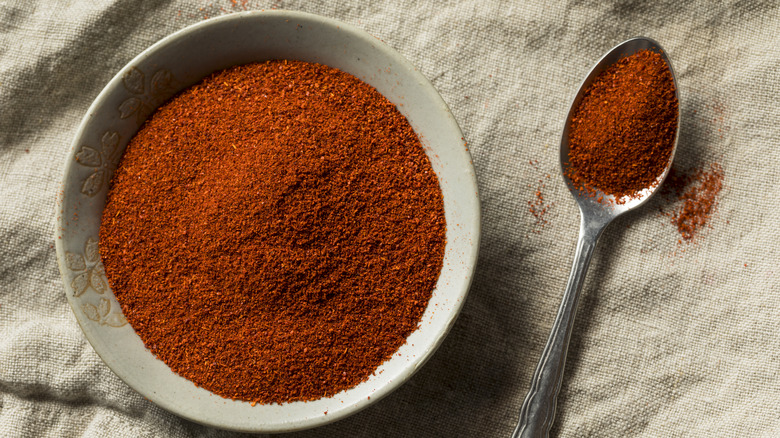The Smoky Spice You Can Use To Make Vegetable Dishes Pop
Whoever said "spice is nice" definitely had the right idea. Whole or ground, spices encompass any of roots, seeds, barks, fruits, or otherwise from a plant source that are meant to enhance the flavor, aroma, and aesthetics. Some spices even have medicinal properties, shares The Journal of Ethnic Foods. With such a wide range of seasonings, it can be overwhelming when you're confronted by shelves upon shelves of colorful containers and tins in the spice aisle at the grocery store. That said, we'd like to introduce you to a smoky spice that'll become your go-to seasoning, especially when it comes to dressing up vegetable dishes.
Despite the fact that every spice is unique, proper storage tends to be pretty generic. Although whole spices often last longer than ground spices, Mrs Dash explains that all spices should be kept in an airtight container away from direct sunlight in a cool, dry space. (Regardless of how well you store your seasonings, chances are that beyond a year, they may start to lose potency.)
While there are all sorts of spices, smoky spices are enticing for the incredible layers of depth they can add to a dish. From pepper and cumin-infused chili powder to fiery cayenne and sweetly hazy chipotle (per Fine Dining Lovers), paprika might just be the most impressive spice powerhouse. But not just any paprika — smoked paprika.
Smoked paprika adds umami richness to vegetarian dishes
Paprika isn't all the same. A ruby red powder made from dried sweet and hot peppers, paprika can be broken into three categories: generic paprika, various Hungarian paprika, and smoked Spanish paprika, MasterClass explains. Also known as pimentón, smoked paprika is made by slowly roasting the peppers over a fire before being pulverized, La Bandera shares. Available as mild (dulce), medium (agridulce), or hot (picante), any rendition of smoked paprika imparts smoky and almost woody nuances to otherwise mild and fruity paprika, delivering an earthy and slightly charred complexity.
Smoked paprika adds a bold flavor and a vibrant color to countless dishes. Savory Spice Shop recommends using paprika as a culinary building block for any recipe, whether that be Spanish paella, Indian curry, or American-style barbecue. While it can work wonders when used in rubs and marinades for meat, smoked paprika can also add dimension to an array of plant-based dishes, especially earthy tomato-focused sauces, soups, and salads, Vegetarian Times explains.
Infusing flavor without ever needing to fire up the grill, the subtle smoke offered by pimentón amps up the umami in vegetable dishes without the addition of any meat-based ingredients, notes Epicurious. A great spice for both the plant-based chef (or the standard veggie lover), smoked paprika is great sprinkled on potatoes or in a peppery vinaigrette to drizzle over roasted squash. Try it and taste the difference for yourself.

